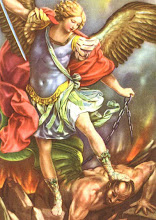http://www.torah.org/learning/yomtov/3weeks/vol1no28.html
Shiva Asar B'Tamuz
Why Do We Fast? - Part II
by Rabbi Yehudah Prero
In the last post we mentioned that we fast on the 17th day of Tamuz because of five tragedies that occurred on that day. We explained what the five tragedies were. However, we still need to explain why we fast: What is the point of fasting, of withholding nourishment from ourselves, on this day?
The Rambam, in the fifth chapter of Hilchos Ta'aniyos (The laws of Fasts) writes that we fast on days that calamities occurred to us "because it can serve to arouse our hearts and to open ourselves to the paths of repentance. It serves as a reminder of our wicked conduct and that of our ancestors which resembles our present conduct, and therefore brought these calamities upon them and upon us. By reminding ourselves of these matters, we will repent and improve our conduct, as the verse says in Vayikra 26:40, 'And they will confess their sin and the sin of their forefathers...'."
One lesson that we see from the Rambam is that fasting in it of itself does not serve a purpose. The Mishna B'rura in 549:1 writes that the fast "is only a preparation for repentance. Therefore, those people who while they fast go on trips and involve themselves in idleness and useless activities have grasped on to the subordinate and set aside the main and essential." We have to remember why we have this day of fasting, and use the time allotted for the correct purpose: to inspire ourselves to repent. But, why are we being inspired to repent now, on the 17th of Tamuz (and on the 9th of Av, etc.)? We were not the cause of the catastrophes that occurred on this day; our forefathers were. Why do WE need to be inspired to repent on this day?
The answer to this is another lesson we glean from the Rambam. We see that the Rambam stresses that we share responsibility for the tragedies that have occurred in the previous generations. The Talmud Yerushalmi (in the tractate of Yoma) tells us that every generation in which the Temple is not rebuilt should consider itself as if the Temple was destroyed in its days. We see that if we were truly greater than the generations who had these tragedies occur to them, we would not be fasting on this day, as we would have a Temple standing in Jerusalem. Because our deeds are not up to par, we have no Temple, and repentance is in order.
We now know why we fast. May we merit to all take this lesson to heart, and see the Temple rebuilt speedily, in our days.
--------------------------------------------------------------------------------
Check out all of the posts on The Three Weeks: 17 Tammuz - 9 Av Mourning the Destruction. Head over to http://www.torah.org/learning/yomtov/ to access the YomTov Page. Then click on the icon for the holiday of your choice.
--------------------------------------------------------------------------------
For questions, comments, and topic requests, please write to Rabbi Yehudah Prero.
http://www.torah.org/learning/yomtov/3weeks/vol1no28.html#
--------------------------------------------------------------------------------
LORD YESHUA HA' MASHIACH ARTICLES AND ARTICLES ABOUT MESSIANIC JEWS JEWS FOR JESUS AND JEWISH CHRISTIANS THE HEBREW CHRISTIANS.
venerdì 16 luglio 2010
Tisha Be-Av and Related Mourning Times
Tisha Be-Av and Related Mourning Times
Tisha Be-Av (the Ninth of Av), while not a holiday God commanded in Scripture, commemorates the destruction of the First and Second Temples. The date has become synonymous with mourning and tragedy. This year, Tisha Be-Av begins at sundown, July 19. (It so happens that the 19th also marks two months since Moishe's home-going.)
Tisha be-Av (the Ninth of Av) commemorates the destruction of the First and Second Temples. In Jewish tradition, the date has become synonymous with mourning and tragedy. Three weeks prior is the less well-known Fast of Tammuz which commemorates the fall of Jerusalem's walls. Between both dates, various mourning customs are practiced by observant Jews.
http://www.jewsforjesus.org/judaica/tishabeav
Tisha Be-Av (the Ninth of Av), while not a holiday God commanded in Scripture, commemorates the destruction of the First and Second Temples. The date has become synonymous with mourning and tragedy. This year, Tisha Be-Av begins at sundown, July 19. (It so happens that the 19th also marks two months since Moishe's home-going.)
Tisha be-Av (the Ninth of Av) commemorates the destruction of the First and Second Temples. In Jewish tradition, the date has become synonymous with mourning and tragedy. Three weeks prior is the less well-known Fast of Tammuz which commemorates the fall of Jerusalem's walls. Between both dates, various mourning customs are practiced by observant Jews.
http://www.jewsforjesus.org/judaica/tishabeav
Iscriviti a:
Commenti (Atom)


















